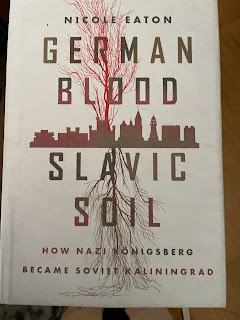 |
| Cousin Sieglinde and me in Kelowna a few years ago |
Sad to say that the last of my mom’s family, born in Ukraine, has passed away. Sieglinde was one of nine family members who crossed the Atlantic, from Bremerhafen to Quebec City on the Beaverbrae in July, 1953. As a toddler, she’d escaped Stalin’s attack on ethnic Germans and grew up in East Prussia before and during the war. In my novels, I fictionalized her as Susanna and will refer to her as S. in this post.
S. didn’t talk much about the past. With stoic resolve, she focused on her new life here in Canada and supported her family with fierce dedication. Her beautiful garden in the mild Okanagan was a treasure and I appreciated the insights she occasionally shared with me about my mom. She understood family dynamics, evolved over decades of struggle, but kept silent unless I asked exactly the right questions. Like with my mom, I had to be careful … I didn’t want to trigger past traumas.
S. was a young teenager when the war ended. Like my mother, a refugee fleeing the Soviets, she never made it to the safety of ships waiting on the Baltic coast. While S. didn’t end up a prisoner of war like my mother, her fate was just as arduous and lasted longer. As a farm labourer under the revenge-seeking Soviets, she was forced to work in one of the newly formed collectives in the now Kaliningrad Oblast. From the summer of 1945 until the fall of 1947, she toiled in the north eastern part of the oblast, close to the Lithuanian border, near a village known as Pillkallen (renamed Schlossberg by the Nazis) and now called Dobrovolsk by the Russians. If you're curious, here's a link to some before and after photos of the village.Almost all the remaining ethnic Germans were finally expelled in late 1948 and she ended up re-connecting with my mom and the surviving family in Schleswig-Holstein.
I wish I knew more about those early years of the Soviet regime in the former East Prussia. I’m eager to dive into Nicole Eaton’s new book, German Blood, Slavic Soil, which just arrived in my mailbox.
Rest in peace, dear cousin. You kept your stories to yourself, but you shared beauty, generosity and kindness towards me and I’m grateful for the family connection. Family stories—our history—live on when we share them. Whether it's through books, photos, songs, recipes, or favourite perennials ... it’s not just about remembering our past. It’s about healing for our future.


.heic)
No comments:
Post a Comment